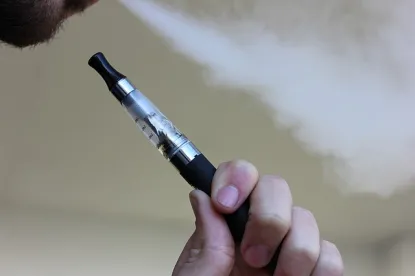Vaping has become quite popular, particularly among young people who may be unaware of the dangers of nicotine addiction associated with this unsafe product.
Among the major manufacturer of e-cigarettes and vapor pods is JUUL that reportedly controls 75 percent of the e-cigarette market and has marketed the products as a safer alternative to cigarettes, which has led to lawsuits alleging deception and misrepresentation in its failure to disclose that its products contain adverse health elements. Cigarette giant Philip Morris bought a 35 percent interest in JUUL in August 2019, for $35 million.
The way e-cigarettes (or vaping) work is by heating up nicotine-containing flavored oils that come in sealed replaceable, single-use pods that create a vapor that can be inhaled by the user. The devices are slim and easily fit in one’s palm or pocket. The enticement for younger people is that the product comes in different flavors camouflaging the nicotine taste. Evidence is being established that e-cigarette manufacturers deliberately marketed their products to children and teens, a vulnerable population in an effort to get them adducted at an early age.
The story made front-page news in September 2019, when a suburban Chicago teen was hospitalized for adverse health effects from vaping. He started vaping at age 16 and said his favorite flavors were mint and mango. The 18-year-old’s lungs reportedly looked like that of a 70-year-old after just two years of vaping use.
E-cigarette manufacturers have promulgated the idea that cigarette smokers can get their nicotine in a manner that somewhat replicates regular smoking experience but without the health risks that have been associated with nicotine use. Lawsuits have been filed against the e-cigarette manufacturers for failing to clearly state the dangerous chemicals contained in their products. Last year, the Lake County State’s Attorney’s Office in Illinois filed a lawsuit against JUUL for violating the Illinois Consumer Fraud and Deceptive Practices Act.
The lawsuit alleges that between 2016 and 2018 “those who reported using e-cigarettes within the past 30 days increased 40% among 8th graders, 82% among 10th graders, and 72% among 12th graders.” According to the lawsuit, the e-cigarette industry had a 2016 market revenue of $7.1 billion, and the e-cigarette industry as a whole expected to see its valuation rise to $44.61 billion by 2023. JUUL is valued at $38 billion.
Millions of these devices are sold annually. According to the World Health Organization (WHO), vaping use has increased dramatically: from some 7 million in 2011 to 41 million in 2018. Users are expected to reach 55 million by 2021. The United States is the largest market in the world.
The WHO cited several health concerns associated with vaping, pointing out that:
- The long-term effects are unknown
- Nicotine in the liquid that is vaporized in an e-cigarette is addictive
- Users replacing the liquid in refillable e-cigarettes might spill the product on their skin, possibly leading to nicotine poisoning
- Some sweeter flavors of e-cigarettes are irritants, potentially causing inflammation of the airways


 />i
/>i

